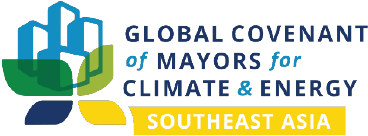19 August 2022 | The Secretariat of the Global Covenant of Mayors for Climate and Energy Southeast Asia (GCoM SEA) organised a technical webinar on National Registry System (Sistem Registri Nasional or SRN) on Friday, 19 August 2022. The virtual event gathered 140 participants from local governments, universities, private sectors, and development partners to learn more about SRN.
The event was a follow-up action to the GCoM National Training on Climate Change Adaptation held in Denpasar (24-25 May 2022). Representing the Ministry of Environment and Forestry (MoEF) of the Republic of Indonesia, the Director of Climate Change Adaptation Sri Tantri Arundhati flew from Jakarta to share the national government’s perspectives in regards to climate change adaptation. At the end of her presentation, she encouraged participating cities and regencies to report their climate actions to SRN. After an in-person consultation meeting with the MoEF, it was decided that a webinar would be organised to introduce the SRN to local governments in Indonesia.
The webinar was begun with welcoming remarks from Seth van Doorn (Project Manager, Foreign Policy Instrument, European Union Delegation for Indonesia and Brunei Darussalam). He mentioned that the GCoM utilises dialogue between the EU and Asian cities to align actions from the local levels. On the same note, Dr. Bernadia Irawati Tjandradewi (Secretary-General, UCLG ASPAC/GCoM SEA Secretariat) emphasised that local governments have done quite a lot of climate-related activities, but they have not been properly reported. This is where SRN comes in, as mentioned by Syaiful Anwar (Director of Greenhouse Gases Inventory, MoEF). In his remarks, he highlights that SRN provides complete information on the attainment of Nationally-Determined Contributions (NDC) to global and national communities.

From the MoEF, Hari Wibowo of the Directorate of GHG Inventory and Koko Wijanarko of the Directorate of Climate Change Adaptation delivered their presentations. Hari mentioned that SRN is part of the transparency framework under Presidential Decree 98/2021 on the Implementation of Carbon Economic Values for Achieving NDC Targets and Controlling Carbon Emissions in National Development. All climate-related activities and sources that have been through monitoring, reporting, and verification (MRV) and reported to the SRN will be awarded Emission Reduction Certification (Sertifikasi Pengurangan Emisi or SPE).
Koko shared the results of the Sixth Assessment Report of Working Group II (Impacts, Adaptation, and Vulnerability) and highlights a very important issue of climate change adaptation at the global and national levels. The objective of Indonesia’s adaptation commitment is to create community and ecosystem resilience to the climate change risks and impacts by 2030 through 3 means: economic resilience, social resilience, and ecosystem and landscape resilience. In the process of achieving the objective, a synergy between parties and non-parties must be built, which includes national government, local governments, private sectors, universities, non-governmental organisations, and development partners.
In light of the synergy, Koko also shared the Climate Village Programme (Program Kampung Iklim or Proklim) managed by the MoEF to increase the involvement of the community and other stakeholders to build their capacity in dealing with climate change impacts and GHG emission reduction as well as to acknowledge all climate-related activities. After mentioning the process and components of Proklim, he also emphasised that Proklim should be reported to the SRN.

Following the presentations from the MoEF representatives, Wahyu Triastuti of the Environment Department of the Tangerang City Government shared the city’s experience in reporting to the SRN. As of now, there are 31 Climate Villages that have been reported with 4 Villages still on the draft. In addition, Tangerang has also reported 2 adaptation and 2 mitigation activities. She mentioned the benefits of reporting to the SRN for Tangerang, such as the availability of updated and valid information on activities. While the challenges are a lack of awareness of the community to document their activities as well as a lack of information on the approved profiles of Climate Villages.

Taking in the stage again, Hari demonstrated how to access SRN, starting from registration, and data entry, until the carbon registry. By the end of the session, facilitated by Andy Armansyah (Technical Consultant, GCoM SEA), participants got to ask questions to the speakers and this led to an exchange of information between national and local governments.
The GCoM Southeast Asia Secretariat fully supports the Government of Indonesia in achieving NDC from the local levels, one of which is by facilitating knowledge-sharing events, like this Webinar on SRN.
“Better reporting for the better NDC’s attainment.”
—
Written by: Rona Ikram Putri









